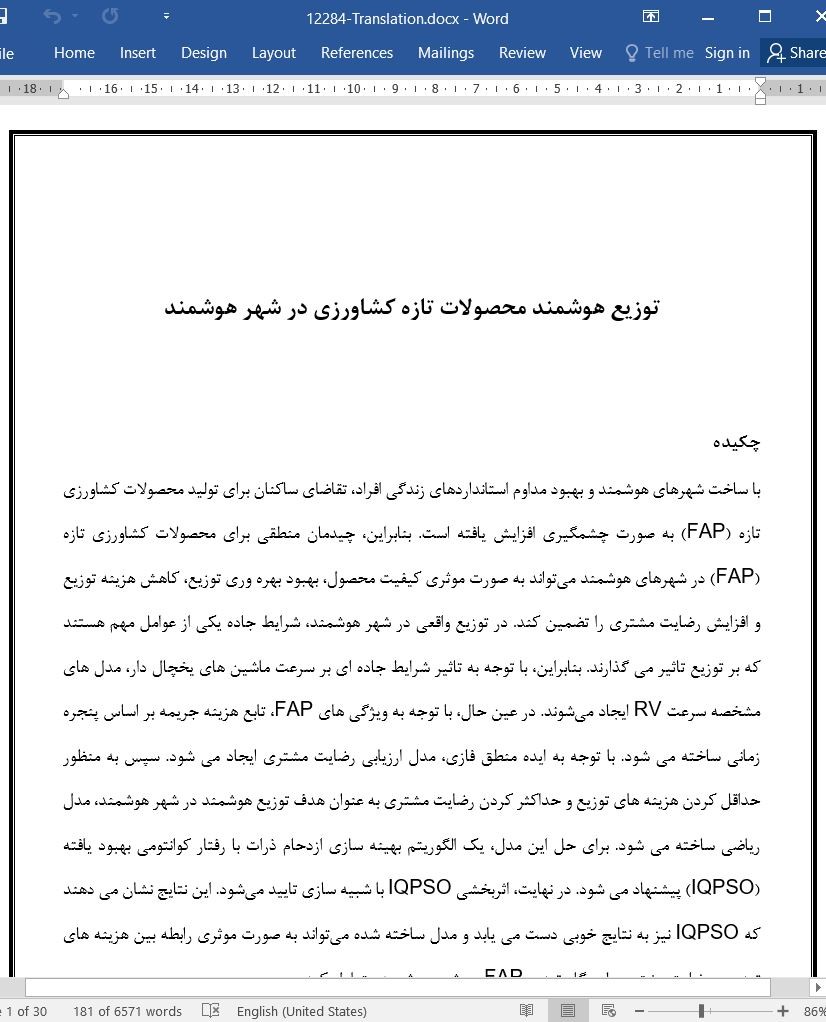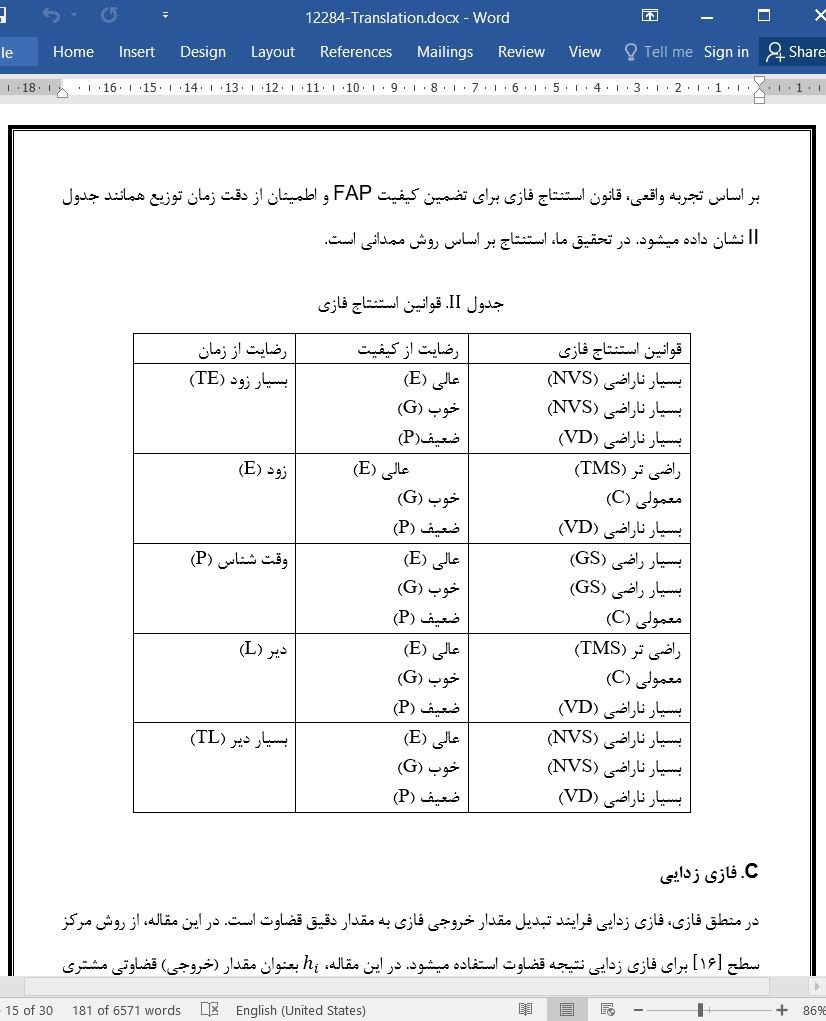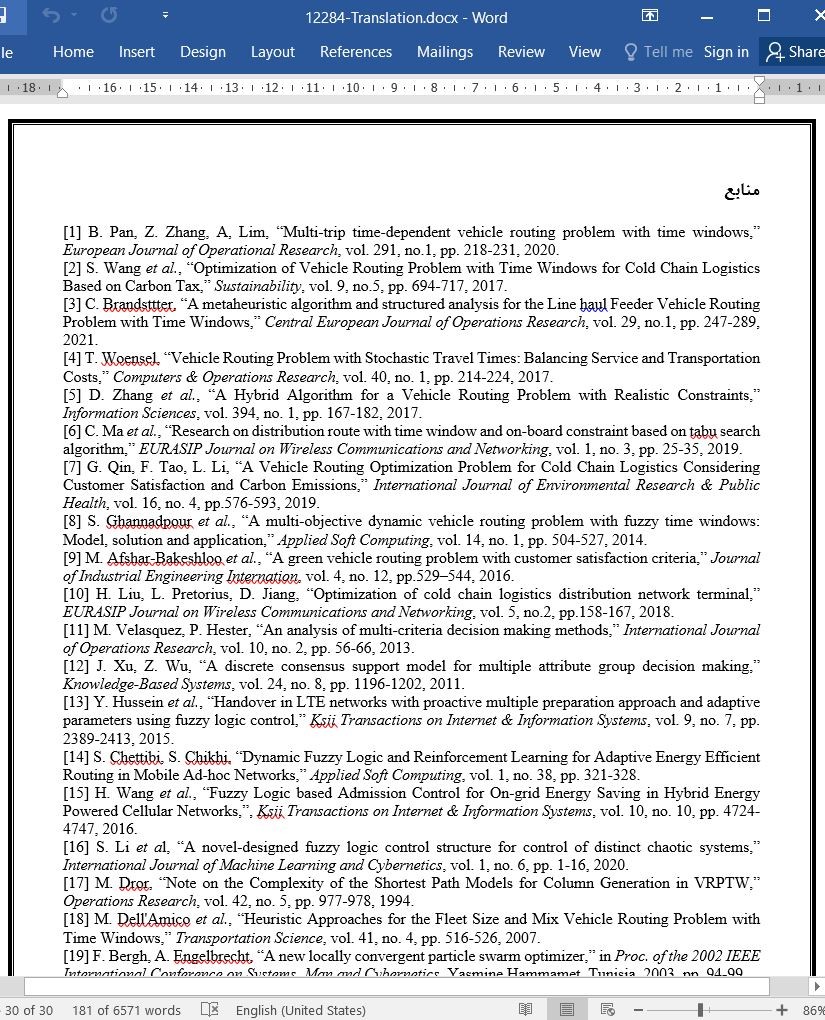
توزیع هوشمند محصولات تازه کشاورزی در شهر هوشمند
چکیده
با ساخت شهرهای هوشمند و بهبود مداوم استانداردهای زندگی افراد، تقاضای ساکنان برای تولید محصولات کشاورزی تازه (FAP) به صورت چشمگیری افزایش یافته است. بنابراین، چیدمان منطقی برای محصولات کشاورزی تازه (FAP) در شهرهای هوشمند میتواند به صورت موثری کیفیت محصول، بهبود بهره وری توزیع، کاهش هزینه توزیع و افزایش رضایت مشتری را تضمین کند. در توزیع واقعی در شهر هوشمند، شرایط جاده یکی از عوامل مهم هستند که بر توزیع تاثیر می گذارند. بنابراین، با توجه به تاثیر شرایط جاده ای بر سرعت ماشین های یخچال دار، مدل های مشخصه سرعت RV ایجاد میشوند. در عین حال، با توجه به ویژگی های FAP، تابع هزینه جریمه بر اساس پنجره زمانی ساخته می شود. با توجه به ایده منطق فازی، مدل ارزیابی رضایت مشتری ایجاد می شود. سپس به منظور حداقل کردن هزینه های توزیع و حداکثر کردن رضایت مشتری به عنوان هدف توزیع هوشمند در شهر هوشمند، مدل ریاضی ساخته می شود. برای حل این مدل، یک الگوریتم بهینه سازی ازدحام ذرات با رفتار کوانتومی بهبود یافته (IQPSO) پیشنهاد می شود. در نهایت، اثربخشی IQPSO با شبیه سازی تایید میشود. این نتایج نشان می دهند که IQPSO نیز به نتایج خوبی دست می یابد و مدل ساخته شده میتواند به صورت موثری رابطه بین هزینه های توزیع و رضایت مشتری را هنگام توزیع FAP در شهر هوشمند متعادل کند.
I. مقدمه
با توسعه مداوم شهرنشینی و شهرهای هوشمند، FAP بیشتر و بیشتری از طریق حالت آنلاین به آفلاین (O2O) به مشتریان تحویل داده میشود. مصرف محصولات کشاورزی تازه (FAP) بین ساکنان شهری و روستایی سال به سال افزایش می یابد. در عین حال، ساکنان نیازمندی های بیشتر را برای به موقع بودن و کیفیت FAP در فرآیند توزیع مطرح میکنند. بنابراین، نحوه چیدمان علمی و منطقی مسیر توزیع برای اطمینان از تازگی FAP، بهبود راندمان توزیع، معاوضه هزینه توزیع و رضایت مشتری یکی از مشکلات مهم توزیع در شهر هوشمند است.
VII. نتیجه گیری
با افزایش نیاز در عصر ساخت شهرهای هوشمند، توزیع هوشمند به ویژه توزیع FAP به بخش مهمی از زندگی روزمره افراد تبدیل خواهد شد. هدف این مقاله، مطالعه توزیع هوشمند FAP در شهرهای هوشمند است. ما به منظور فرمولبندی کردن علمی و معقول مسیرهای توزیع که رابطه بین هزینه های توزیع و رضایت مشتری را متعادل می کنند، یک مدل ریاضی ایجاد می کنیم. اثربخشی و پایداری الگوریتم با استفاده از IQPSO برای آزمایش های مرتبط تایید می شود. این نتایج نشان می دهند که مدل ایجاد شده و الگوریتم مورد استفاده می توانند به طور موثری رابطه بین هزینه های توزیع و رضایت مشتری را متعادل کنند. بنابراین، یک راه حل جدید برای ایجاد تعادل در رابطه بین هزینه های توزیع و رضایت مشتری در توزیع هوشمند FAP در شهر های هوشمند ارائه می شود. ما در مطالعات تحقیقاتی آینده، مدل ریاضی VRP را با نقاط چند عرضه ای و نقاط چند تقاضایی مطالعه میکنیم. علاوه بر این، انواع مختلف وسایل نقلیه را مشخص خواهیم کرد تا خدمات توزیع را برای مشتریانی با تقاضاهای متفاوت ارائه دهیم.
Abstract
With the construction of smart cities and the continuous improvement of people's living standards, residents’ demand for fresh agricultural products (FAPs) has increased dramatically. Therefore, reasonable arrangement for intelligent distribution of FAP in smart cities can effectively guarantee product quality, improve distribution efficiency, reduce distribution cost, and increase customer satisfaction. In actual distribution in smart city, road conditions are one of the important factors that affect the distribution. Therefore, according to the influence of road conditions on refrigerated vehicle's (RV's) speed, the RV's speed characteristic models are established. Meanwhile, according to the characteristics of FAP, the penalty cost function based on the time window is constructed. According to the idea of fuzzy logic, the customer satisfaction evaluation model is established. Then, in order to minimize the distribution costs and maximize customer satisfaction as the optimization goal of intelligent distribution in smart city, the mathematical model is built. For solving this model, an improved quantum-behaved particle swarm optimization algorithm (IQPSO) is proposed. Finally, the effectiveness of IQPSO is verified by simulation. The results show that IQPSO also achieves good results, and the model constructed can effectively balance the relationship between the distribution costs and customer satisfaction when distributing FAP in smart city.
I. INTRODUCTION
WITH the continuous development of urbanization and smart cities, more and more FAP are delivered to customers through Online to Offline (O2O) mode. The consumption of fresh agricultural products (FAP) between urban and rural residents increases year by year. Meanwhile, residents put forward higher requirements for timeliness and FAP’s quality in distribution process. Therefore, how to arrange the distribution route scientifically and rationally to ensure the freshness of FAP, improve the distribution efficiency, trade off the distribution cost and customer satisfaction is one of the important problems for distribution in smart city.
VII. CONCLUSION
In the era of the construction of smart cities, intelligent distribution will become an important part of people’s daily life, especially the FAP’s distribution with higher requirements. This paper aims to study the FAP’s intelligent distribution in smart cities. In order to formulate distribution routes scientifically and reasonably, which balances the relationship between distribution costs and customer satisfaction, we establish a mathematical model. By using IQPSO for related experiments, the effectiveness and stability of the algorithm are verified. The results show that the established model and the algorithm used can effectively balance the relationship between distribution costs and customer satisfaction. Therefore, it provides a new solution for balance the relationship between distribution costs and customer satisfaction in FAP’s intelligent distribution in smart cities. In our future works, we will study the mathematical model of VRP with multi supply points and multi demand points. In addition, we will arrange different types of vehicles to provide distribution services for customers with different demands.
چکیده
I. مقدمه
II. مدل سیستم
A. اصل سیستم توزیع هوشمند FAP
B. مفروضات توزیع هوشمند FAP
C. نماد ها
III. تحلیل هزینه های توزیع
A. تحلیل هزینه حمل و نقل RV
B. تحلیل هزینه خسارت FAP
C. تحلیل هزینه جریمه
IV. رضایت مشتری بر اساس منطق فازی
A. فازی سازی پارامترهای قضاوت
B. استقرار قوانین استنتاج فازی
C. فازی زدایی
V. استقرار مدل و طراحی الگوریتم
A. استقرار مدل
B. طراحی الگوریتم
1) الگوریتم IQPSO
2) تحلیل پیچیدگی
VI. شبیه سازی و تحلیل
A. نتایج و تحلیل تابع آزمون استاندارد
B. پارامترهای شبیه سازی و تحلیل موردی
1) پارامترهای شبیه سازی
2) انتخاب پارامتر
3) تحلیل موردی
VII. نتیجه گیری
منابع
Abstract
I. INTRODUCTION
II. SYSTEM MODEL
A. Principle of FAP Intelligent Distribution System
B. Assumptions of FAP Intelligent Distribution
C. Symbols
III. ANALYSIS OF DISTRIBUTION COSTS
A. RV Transportation Cost Analysis
B. Damage Cost of FAP Analysis
C. Penalty Cost Analysis
IV. CUSTOMER SATISFACTION BASED ON FUZZY LOGIC
A. Judgment Parameters Fuzzification
B. Fuzzy Inference Rules Establishment
C. Defuzzification
V. MODEL ESTABLISHMENT AND ALGORITHM DESIGN
A. Model Establishment
B. Algorithm Design
1) IQPSO Algorithm
2) Complexity Analysis
VI. SIMULATION AND ANALYSIS
A. Standard Test Function Results and Analysis
B. Simulation Parameters and Case Analysis
1) Simulation Parameters
2) Parameter Selection
VII. CONCLUSION
REFERENCES
- ترجمه فارسی مقاله با فرمت ورد (word) با قابلیت ویرایش، بدون آرم سایت ای ترجمه
- ترجمه فارسی مقاله با فرمت pdf، بدون آرم سایت ای ترجمه



